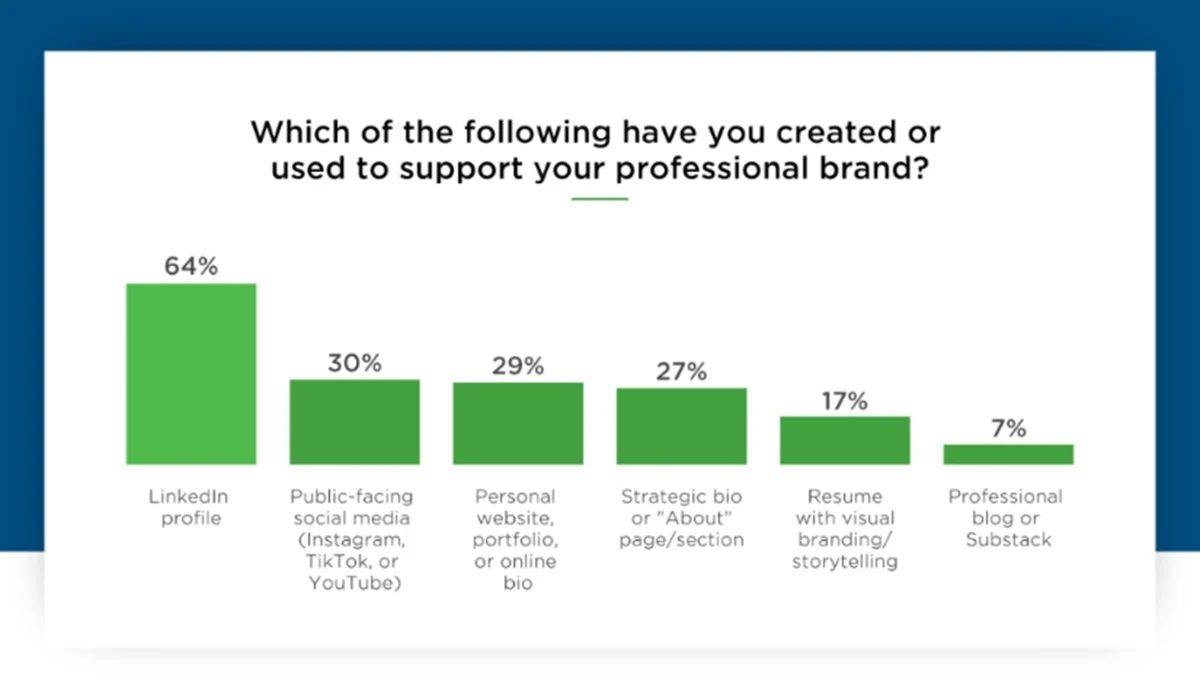Employees and executives are increasingly judging career-worthiness by the maturity of one’s digital personal brand. A new study conducted on behalf of Aurora University finds that half of American professionals now believe a strong digital presence matters more than a traditional résumé. Among business executives, that figure jumps to 61%.
While emphasis on crafting an online persona continues to rise, emotional and psychological costs are becoming more prevalent, evolving into a source of burnout, self‑censorship, and identity-hiding.
Digital personal branding’s appeal lies in its potential to build stronger networks and land interviews. In other words, personal branding gets people hired. But when carelessly executed, personal branding can carry significant costs. For example, one in five professionals says they missed out on opportunities because their online image didn’t match their real one.
Professionals are rethinking how they show up online, spurred by layoffs, career shifts, and a rapidly evolving job market. In fact, nearly one in three are repositioning their personal brand in pursuit of a new opportunity, such as breaking into a different industry, teeing up a leadership jump, or lobbying for a new role. Gen Z leads the charge at 40%, and millennials follow at 28%. The most common motivations for re-strategizing personal brands include purpose, burnout, and stagnation.
Indeed, rebranding often takes place during a professional inflection point. For some, this might include bouncing back from layoffs. For others, this means aiming higher professionally, often into leadership or grad school. Regardless of motivation, nearly half of all professionals say their online presence now signals readiness for that next step. For Gen X, it’s 54%. For Gen Z, 52%.
However, personal branding and its need for sustained positioning can come at a cost. Thirty-eight percent say it’s caused burnout. For Gen Z, that number climbs to 40%. For many, personal branding itself is work, as nearly four in ten say it feels like a second job.
Fatigue from personal branding is widespread. Forty percent have stepped back from growing their digital visibility by skipping content creation and pausing networking. In fact, many employees report choosing to stay offline for months as a means of recovery. And then there’s the fear and insecurity that can come with self-promotion. Nearly half avoid digital personal branding in order not to appear “arrogant.” Many professionals report feeling judged for their gender, their introversion, or their industry.
Authenticity often takes a hit, too. Eighteen percent feel constant pressure to curate their digital personal brand. Forty-six percent have deleted posts out of fear. Over half have hidden parts of who they are to seem more “professional.” No wonder 72% have Googled themselves. In today’s career journey, the digital mirror matters more and more.
Recognizing branding as strategic
The data from Aurora University[1] show that it’s no longer enough to have a neat résumé. Professionals must also proactively build their digital personal brands. Indeed, half of professionals believe branding now outpaces résumé strength.
LinkedIn is the primary arena for personal branding online (64%). Professionals who ignore their digital presence may become less visible or misrepresented by outdated profiles. To this end, one in five reported having lost opportunities due to a misaligned online presence.
Professionals (especially younger cohorts) should treat branding as a dynamic process. Fully 32% of employees were found to be repositioning their brand for new roles, platforms, or leadership levels. The motivations (purpose‑seeking, plateau, and burnout) reveal that repositioning often follows deeper career reflection.
Yet the imperative to be visible online carries costs, including self‑promotion anxiety, identity hiding, and fatigue. Organizations often emphasize “thought leadership” or “personal brand.” Many, however, underestimate the emotional labor involved in these pursuits. Professionals should protect their wellbeing as they engage digitally and publicly.
Finally, a strong thematic finding from the study involved the tension between “being real” and “looking polished.” Nearly half of the respondents adjusted or deleted posts because they felt afraid of being misinterpreted. Of course, branding is about choosing when and how to express oneself. But authenticity remains a valuable differentiator.
Proposed Actions: How Professionals Should Respond
Know your why. Are you prepping for grad school? Chasing leadership? Making a pivot? Your brand should reflect that. Nearly half of professionals use their brand to signal readiness for something bigger.
Don’t overdo it. LinkedIn is key, but you don’t need to be everywhere all the time. Most people post only when it feels relevant. Find a rhythm that works and protects your time.
Keep it real. Over half of professionals hide parts of themselves to appear more “professional.” That’s short-term thinking. Authenticity builds trust. Treat branding like any other job with boundaries, breaks, and regular check-ins.
Broader Implications: The Changing Nature of Career Capital
Second, career management is becoming content‑driven. Professionals now curate their digital traces: posts, blogs, about sections, and website portfolios. These traces serve as living archives of professional identity.
Third, the emotional dimension of careers is receiving more attention. Branding now overlaps with identity, authenticity, and stress. Moving forward, career strategies ought to include a wellbeing dimension, given that 38% describe personal branding as “a second job.”
Finally, intergenerational dynamics play a significant role in digital personal branding. Younger professionals (Gen Z especially) lead in updating brands, repositioning for new career stages, and feeling brand‑driven pressure. Companies and institutions should recognize that the expectations of emerging talent differ.
Conclusion
How you present yourself online increasingly affects your career prospects offline. Smart professionals will treat branding as part of their career ecosystem, intentionally balancing visibility, authenticity, and wellbeing. Ultimately, the question is both what your personal brand says about you and how sustainably you build it.
Read next: Where AI Sounds Caring Yet Misses The Point In Mental Health Support[2]
References
- ^ The data from Aurora University (online.aurora.edu)
- ^ Where AI Sounds Caring Yet Misses The Point In Mental Health Support (www.digitalinformationworld.com)




